Hitachi Deskstar 7K1000 in RAID 0: Is Two Terabytes really better than One?
by Gary Key on April 19, 2007 12:15 AM EST- Posted in
- Storage
Hard Disk Performance: PCMark05
We are utilizing the HDD test suite within PCMark05 for further comparative hard disk scores as it provides a mixture of actual application results and specific read/write percentages utilized within these programs. It is also a readily available benchmark that others can use for comparative purposes. The program utilizes the RankDisk application within the Intel iPeak SPT suite of tools to record a trace of disk activity during usage of real world applications. These traces are then replayed to generate performance measurements based upon the actual disk operations within each application. The HDD test suite contains 53% read and 47% write operations with each trace section utilizing varied amounts of read or write operations. Additional information about the test suite can be found in PDF format here PCMark05 whitepaper.
The PCMark05 test results are based upon the following trace runs:
Windows XP Startup: This test consists of 90% reading and 10% writes that tracks XP activities at start-up.
Application Loading: This test consists of 83% reading and 17% writes that tracks the opening and closing of the following programs.
File Write: This test consists of 100% write activities by writing 680MB of files onto the hard disk.
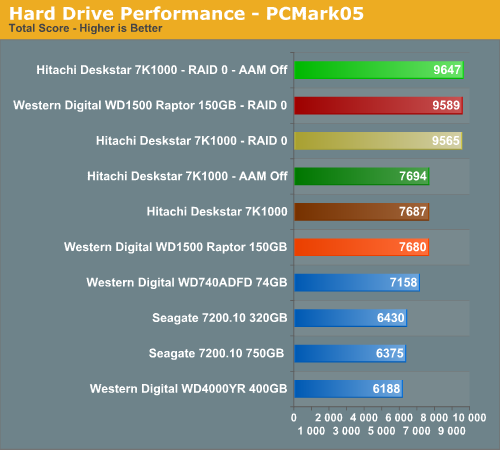
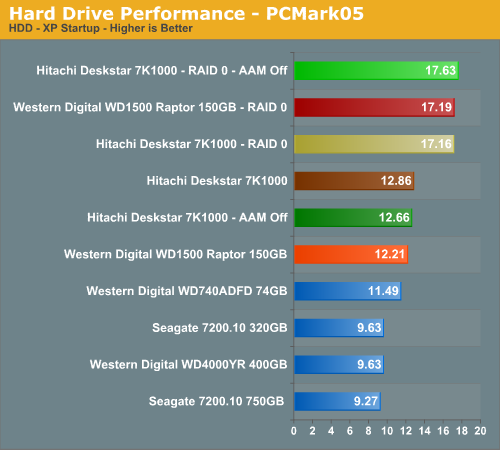
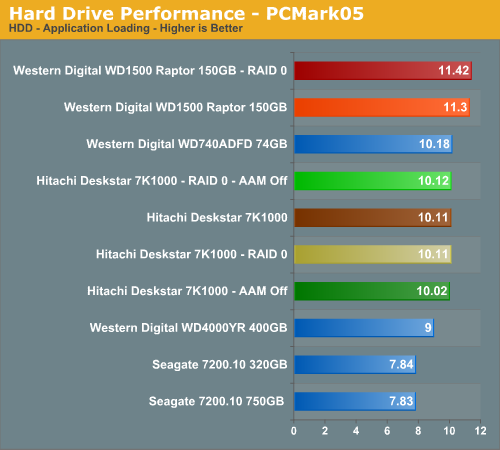
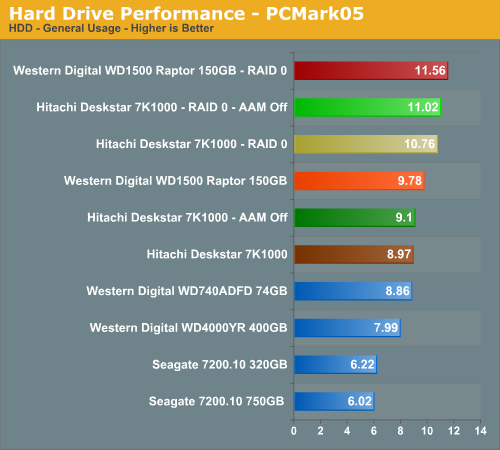
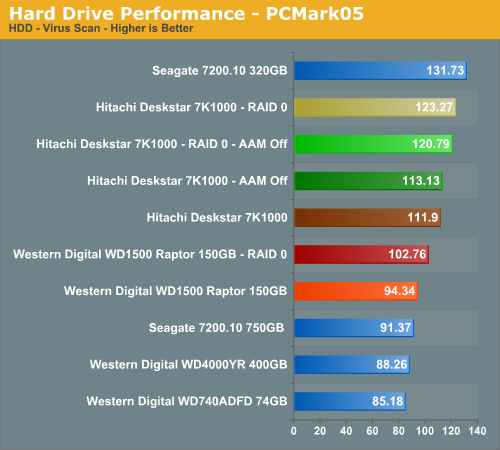
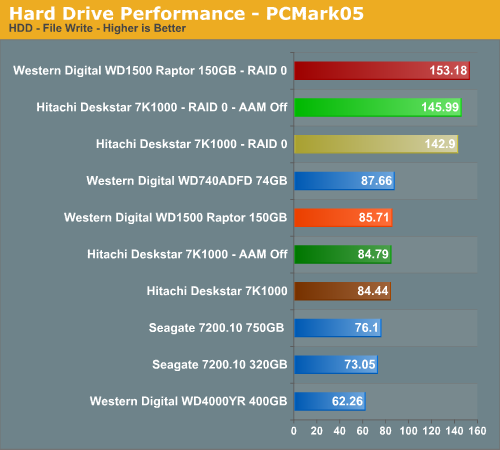
Our PCMark05 RAID 0 results show a 25% improvement over the single Hitachi drive results. The 7K1000 combination still scores better than the WD 150GB Raptor setup in this benchmark provided AAM is turned off, although the differences are minor. The major performance delta between the 7K1000 single and RAID 0 configuration is in the Windows Startup and File Write tests. As a side test that we are still developing, we tracked our actual XP startup times with each configuration. The RAID 0 setups only improved startup times by a few tenths of a second in most cases.
We fully expected the File Write tests to show major improvements as this is an area where RAID 0 will show an advantage. We see minor differences occurring in the General Usage and Application Loading sections of the test where write and read operations are balanced to a certain degree.
The Raptor's superior rotational/access speeds allow it to basically score slightly better than the 7K1000 except in the Virus Scan test where the 7K1000 has exceptional scores, even though it still lags behind the Seagate drive. Overall, if you need to improve your PCMark05 benchmark scores then RAID 0 will certainly do that, but as evidenced in the General Usage and Application results which mimic actual applications there is minimal impact.
We are utilizing the HDD test suite within PCMark05 for further comparative hard disk scores as it provides a mixture of actual application results and specific read/write percentages utilized within these programs. It is also a readily available benchmark that others can use for comparative purposes. The program utilizes the RankDisk application within the Intel iPeak SPT suite of tools to record a trace of disk activity during usage of real world applications. These traces are then replayed to generate performance measurements based upon the actual disk operations within each application. The HDD test suite contains 53% read and 47% write operations with each trace section utilizing varied amounts of read or write operations. Additional information about the test suite can be found in PDF format here PCMark05 whitepaper.
The PCMark05 test results are based upon the following trace runs:
Windows XP Startup: This test consists of 90% reading and 10% writes that tracks XP activities at start-up.
Application Loading: This test consists of 83% reading and 17% writes that tracks the opening and closing of the following programs.
- Microsoft Word
- Adobe Acrobat Reader
- Windows Media Player
- 3Dmark 2001SE
- Leadtek WinFast DVD
- Mozilla Internet Browser
- Opening a Microsoft Word document, performing grammar check, saving and closing
- Compression and decompression using WinZip
- Encrypting and decrypting a file using PowerCrypt
- Scanning files for viruses using F-Secure Antivirus
- Playing an MP3 file with Winamp
- Playing a WAV file with Winamp
- Playing a DivX video using the DivX codec and Windows Media Player
- Playing a WMV video file using Windows Media Player
- Viewing pictures using Windows Picture Viewer
- Browsing the Internet using Microsoft Internet Explorer
- Loading, playing and exiting a game with Tom Clancy's Ghost Recon
File Write: This test consists of 100% write activities by writing 680MB of files onto the hard disk.






Our PCMark05 RAID 0 results show a 25% improvement over the single Hitachi drive results. The 7K1000 combination still scores better than the WD 150GB Raptor setup in this benchmark provided AAM is turned off, although the differences are minor. The major performance delta between the 7K1000 single and RAID 0 configuration is in the Windows Startup and File Write tests. As a side test that we are still developing, we tracked our actual XP startup times with each configuration. The RAID 0 setups only improved startup times by a few tenths of a second in most cases.
We fully expected the File Write tests to show major improvements as this is an area where RAID 0 will show an advantage. We see minor differences occurring in the General Usage and Application Loading sections of the test where write and read operations are balanced to a certain degree.
The Raptor's superior rotational/access speeds allow it to basically score slightly better than the 7K1000 except in the Virus Scan test where the 7K1000 has exceptional scores, even though it still lags behind the Seagate drive. Overall, if you need to improve your PCMark05 benchmark scores then RAID 0 will certainly do that, but as evidenced in the General Usage and Application results which mimic actual applications there is minimal impact.










48 Comments
View All Comments
Gaelstorm - Wednesday, October 8, 2008 - link
This article was a long time ago, but the second to last comment before mine was talking about fair. If a program is not hard drive intensive and is just slow all around like the Sim 2, you are not being fair by mentioning that Raid 0 doesn't help it. Honestly nothing will help with that games load time except a faster computer overall. Even so that game loads horrible for the type of game it is. I can tell you right now, there are very few situations I have encountered where Raid 0 didn't way outperform a single drive for gaming or just feel on a desktop type system. All the arguing I read, actually made me rethink trusting information from certain sources at all.Per Hansson - Tuesday, April 24, 2007 - link
Some ideas, as could be seen on page 4 of the review the system was limited by something (flat graph in STR instead of what you would expect)This is probably because you are using the normal SCSI Miniport driver, which happens to be the only choice for Win2K and WinXP 32 bit
WinXP 64bit, 2003 Server 32bit and 64 bit and Vista 32 bit and 64 bit has the new StorPort miniport driver, which improves performance tremendeously in RAID arrays
Of course the controller cards driver must also actually support and use the StorPort driver instead of the normal SCSI miniport driver
What this means in laymens terms is that it was not because the "software based" RAID controllers where crap that we got shitty performance in Win2K and XP, it was because those controllers had shitty drivers. Which really was MS fault.
The really expensive RAID controllers however did not use the NT4/2000 Server etc native SCSI miniport driver but had their very own implementation (just as good as MS "all new" storport driver) which meant that they where not capped at about 100-150MB/sec, but rather unlimited... Try your review with 4 150GB Raptors in RAID-0, your performance will be the same because it is the drivers that is holding the system back...
Please keep this in mind for your upcoming review ;)
http://download.microsoft.com/download/5/6/6/5664b...">http://download.microsoft.com/download/...06-45ec-...
ShadowdogKGB - Saturday, April 21, 2007 - link
You have 5 synthetics that tell us that two are faster in stripe but then you have 5 real world tests that aren't real world at all. Tell me who plays HL2 Lost Coast and Sims2 Neighborhood. I think you should just stop testing raid setups all together since you can't be honest about it.Gary Key - Sunday, April 22, 2007 - link
The Sims2 continues to be one of the top selling/played games in the world and HL2 along with its various versions is also a top played title. We are revising our benchmark suite to include WoW and a couple of other titles that were recently released. As far as the other benchmarks, compression/decompression and encoding are fairly common activities on a PC the last time I checked. ;-) What are we not being honest about?
jleboeuf - Saturday, April 21, 2007 - link
I'd be interested to see what your results fair out w/ a raid 10 config w/ 6 drives. that's 3 terabytes, and completely mirroredaethyrmaster - Friday, April 20, 2007 - link
They said they only used a 64 kB (KiB if you prefer) stripe size. Using stripes of 128 kB size would most likely have changed the results significantly. If possible, I'd like to see results with a 256 kB stripe as well.Separately, I personally have used RAID 0, as well as used exactly the same drives in a non-RAID setup. I often times do a lot of transferring of video from my PC to other devices on a Gigabit ethernet network, and the extra 10 to 30 MB/sec transfer rate provided by RAID 0 is well appreciated when you are copying 400 to 800 MB (MiB) of video.
GOSHARKS - Friday, April 20, 2007 - link
Is that even statiscally significant? As it is, it can be slightly misleading.
Gary Key - Sunday, April 22, 2007 - link
Not in the grand scheme of things but the tests were run five different times with the same results. We were providing information based upon having a retail drive to test instead of the OEM drive we had in the first article. There were a few comments that suggested differences could have existed between the two so we tried to answer it.
tshen83 - Thursday, April 19, 2007 - link
reviewing a 1TB drive by raid 0? the writer obviously have NO FREAKING IDEA of what the target audience is. A RAID5 review would be much more appropriate. Hate to lose 100GB of data nowadays...let alone 2TB, at that point, you might as well kill yourselfGary Key - Thursday, April 19, 2007 - link
We have a full RAID article in the works that will test RAID 1, RAID 1+0, and RAID 5 with several drives, Intel and NV chipsets, along with hardware controllers. As I mentioned in the article, this story will be up in the coming weeks. As far as offering RAID 0 results with a motherboard controller chipset, this was done as the vast majority of boutique systems offer this option along with several hundred emails asking when we could provide RAID 0 results with the latest drive releases.